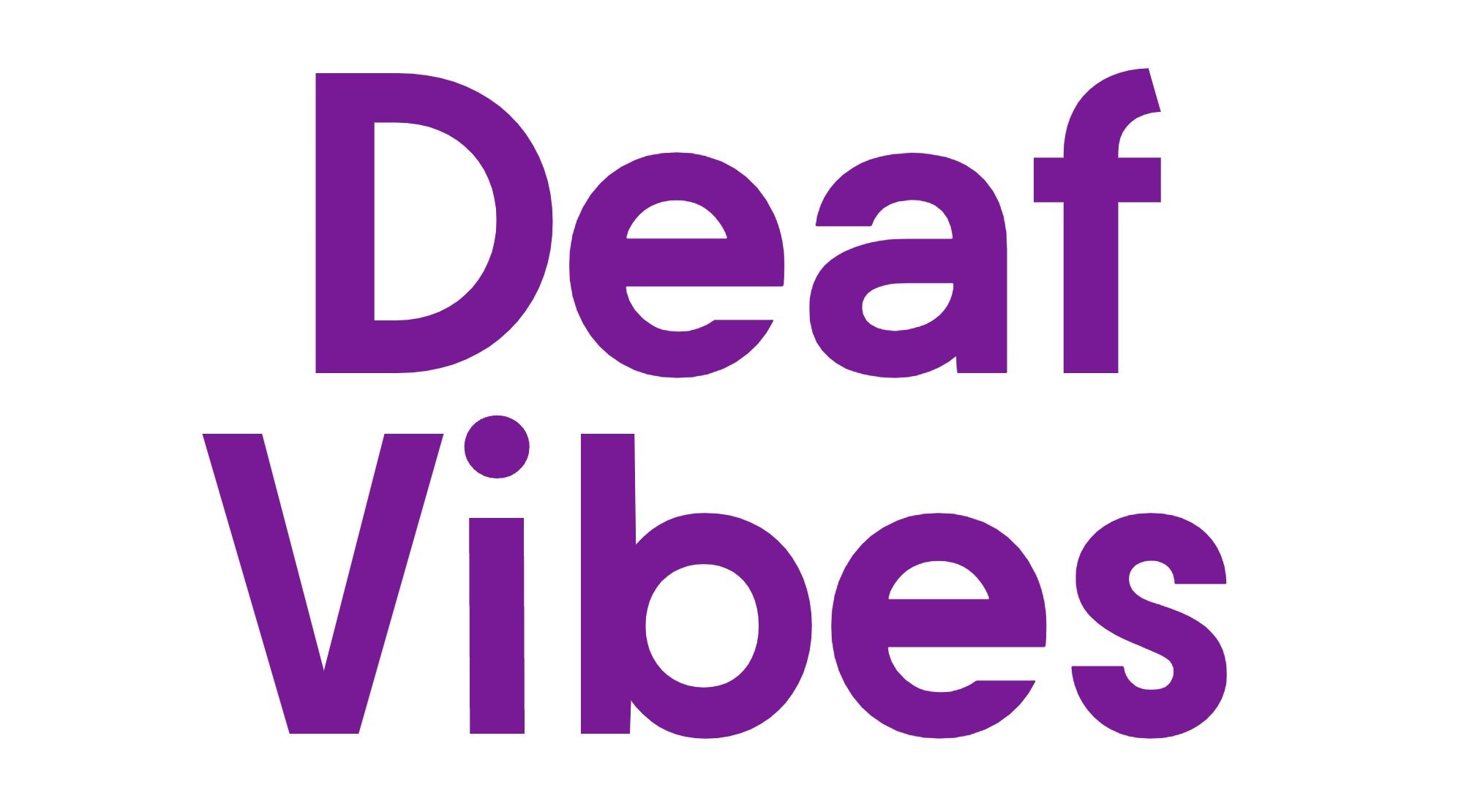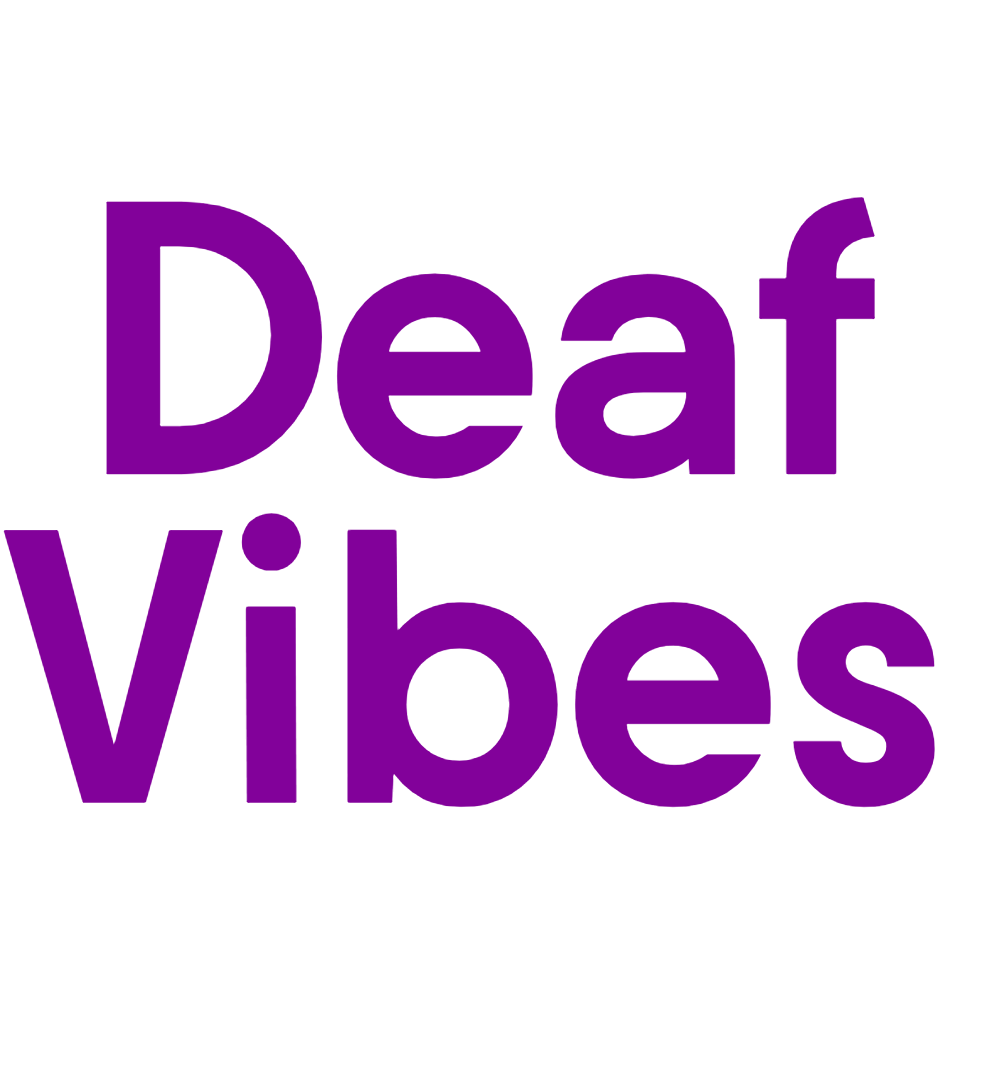Therapies and Interventions
Mastering WH Questions in Speech Therapy
Yearning to unlock the secrets of mastering WH questions in speech therapy? Discover practical strategies and activities that can revolutionize language development and communication skills.
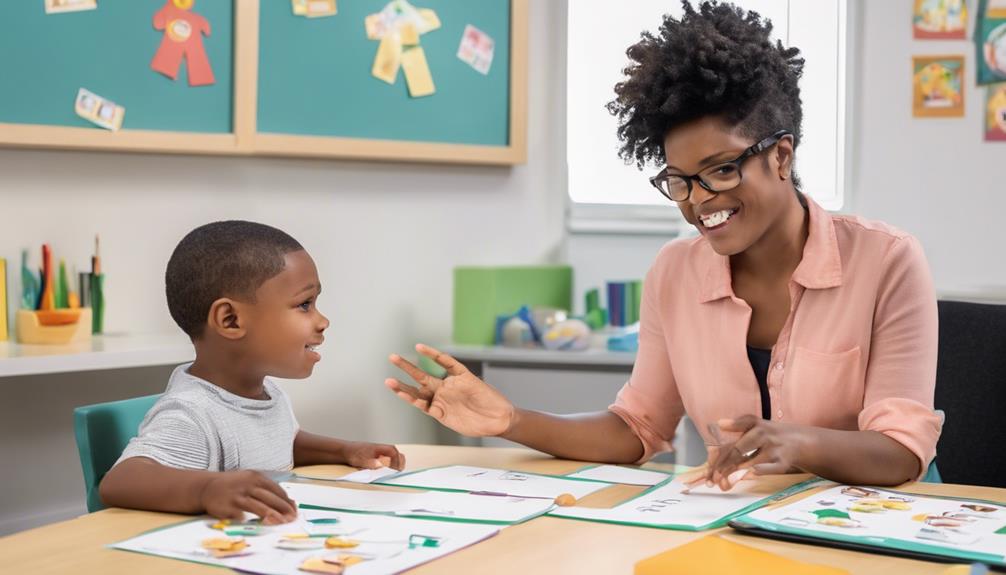
As speech therapists, we have all faced the challenge of assisting children in mastering WH questions. Being able to handle such inquiries is critical for efficient communication, but what strategies can we employ to best aid our clients in developing this vital skill?
By exploring various strategies, techniques, and activities tailored to individual needs, we can lay the foundation for significant progress in WH question mastery.
Join us as we delve into practical approaches that can make a real difference in enhancing language development and communication skills for the children we work with.
Key Takeaways
- Understanding different types of WH questions is crucial for effective communication skills.
- Employing strategies like role-playing and varied contexts enhances WH question mastery.
- Targeted interventions and practice aid in developing accurate responses to WH questions.
- Tracking progression and providing support are vital for improving WH question skills in speech therapy.
Understanding Different WH Questions
Understanding the various types of WH questions is fundamental in enhancing communication skills during speech therapy sessions. In speech therapy, we often work with children to help them develop language and communication milestones. One crucial aspect of this development is the ability to answer different types of WH questions. These questions, including Who, What, Where, When, Why, and How, play a significant role in expanding a child's vocabulary and understanding of the world around them.
Who questions focus on individuals or characters, encouraging the child to recall specific people or seek personal information. What questions typically involve objects or actions, often being the first type of question that children can answer as they're concrete and observable. Where questions help children understand locations, starting with more tangible responses. When questions, on the other hand, involve time-related inquiries, which can range from more general to specific instances. By mastering these different types of WH questions, children can provide semantically correct responses, enhancing their communication skills in speech therapy sessions.
Strategies for Asking WH Questions
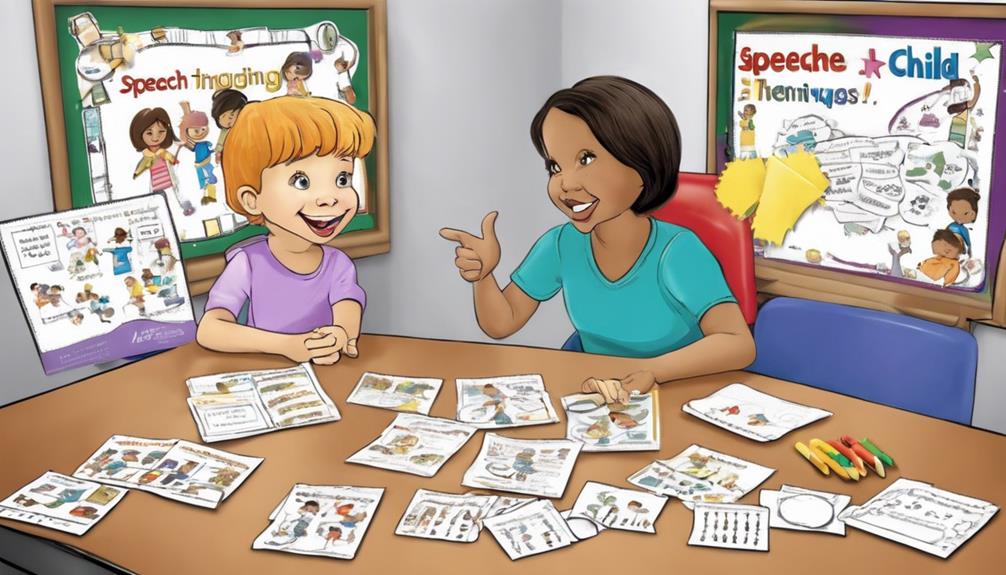
Utilizing visual aids and practicing in diverse contexts are key strategies for enhancing the effectiveness of asking WH questions in speech therapy sessions. Visual aids such as pictures or objects can help individuals better comprehend and process the information related to WH questions. By incorporating visual elements, the understanding of the questions is improved, making it easier for clients to formulate responses.
Practice plays a crucial role in solidifying the ability to ask WH questions. When individuals practice asking these questions in various contexts, they can generalize their skills and better understand how to apply them in different situations. Furthermore, breaking down complex WH questions into simpler components can facilitate learning and response, making it easier for clients to engage with the material.
Feedback and reinforcement are essential components of asking WH questions. Providing positive reinforcement when a client answers a question correctly can help reinforce learning and encourage active participation. Encouraging active listening and engagement during WH question activities not only enhances participation but also fosters skill development in a more interactive manner.
Techniques for Answering WH Questions
When addressing Techniques for Answering WH Questions, we emphasize utilizing strategies like role-playing for practice.
This technique can assist in creating real-life scenarios that aid in comprehension and retention.
Strategies for WH Questions
In speech therapy, we employ visual aids and real-life examples to facilitate children's comprehension and responses to various types of WH questions. To enhance learning and engagement, interactive activities tailored to each WH question type are utilized. Encouraging critical thinking, we prompt children to explain their responses to 'Why' questions, fostering reasoning skills. Structured practice scenarios are essential for honing language comprehension and communication skills through asking and answering WH questions. Progress tracking is integral in monitoring accuracy and fluency of WH question responses over time to evaluate advancements in speech therapy.
| Strategies for WH Questions | Benefits |
|---|---|
| Use visual aids | Facilitates comprehension |
| Real-life examples | Enhances learning |
| Interactive activities | Promotes engagement |
| Progress tracking | Monitors improvement |
Role-playing for Practice
Moving from honing language comprehension through structured practice scenarios, we now shift our focus to the hands-on technique of role-playing for practicing answering WH questions. Role-playing allows children to immerse themselves in simulated real-life settings to enhance their understanding and response skills.
Here are key benefits of incorporating role-playing in speech therapy sessions:
- Interactive approach for improved comprehension
- Understanding context and applying language structures effectively
- Enhancing critical thinking and problem-solving abilities
- Boosting confidence in answering WH questions
Through role-playing, children actively engage in scenarios that require them to think critically, solve problems, and respond to WH questions with confidence and clarity, fostering a more holistic development of their speech and language skills.
Types of WH Questions in Speech Therapy
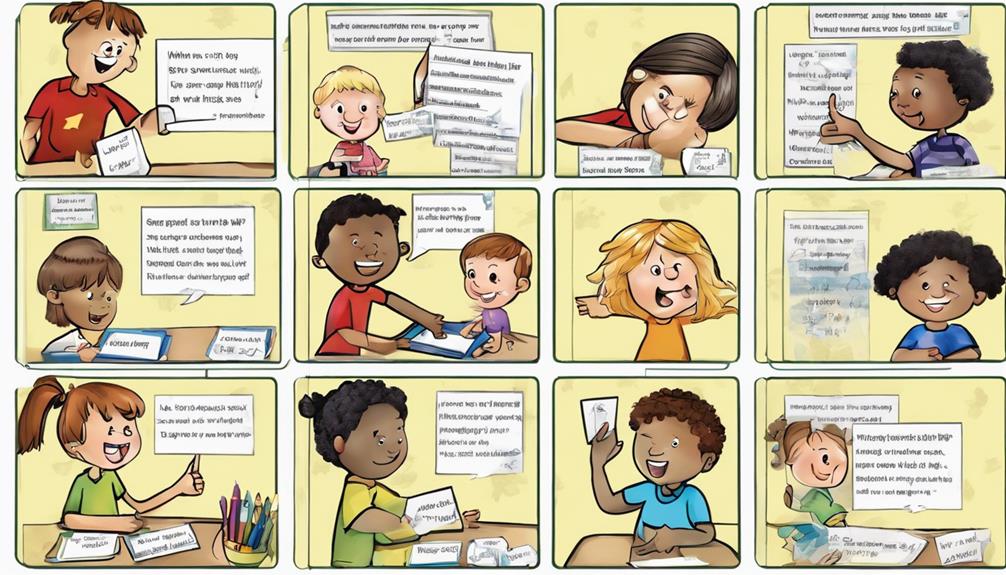
Let's explore the various types of WH questions used in speech therapy. Understanding the distinctions between Who, What, Where, When, and Why questions is crucial for effective communication interventions.
Each type serves a unique purpose in facilitating language development and enhancing conversational skills.
WH Question Types
When working on WH question types in speech therapy, it's essential to understand the distinct purposes of Who, What, Where, When, and Why questions.
- Who questions focus on people or characters, seeking recall or personal information.
- What questions inquire about something and are often the first questions a child can answer.
- Where questions ask about specific locations, starting with concrete answers.
- When questions inquire about time, ranging from general to specific instances.
Understanding these different types of WH questions is crucial for speech development and enhancing language skills. By targeting specific question types, therapists can guide individuals towards reaching communication milestones and effectively answering WH questions in various contexts.
Speech Therapy Strategies
Implementing tailored teaching strategies for different types of WH questions is essential in speech therapy to enhance communication skills effectively.
Various types of WH questions, such as Who, What, Where, When, Why, and How, serve distinct purposes in facilitating language development and social interactions.
Speech therapists employ specific teaching methods for each WH question type to address cognitive abilities and support children's progress effectively.
Progress monitoring plays a vital role in speech therapy, allowing therapists to assess proficiency across different WH question types and adjust interventions accordingly.
Common Challenges With WH Questions
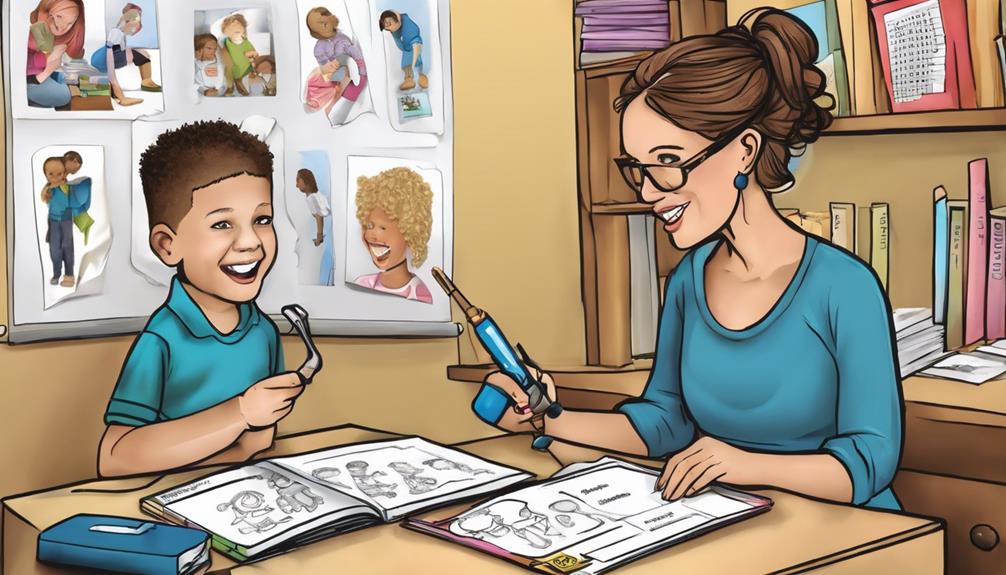
Understanding the various meanings of WH questions poses significant challenges for children, requiring differentiation skills and comprehension abilities. When addressing WH questions in speech therapy, several common challenges may arise:
- Difficulty distinguishing between different types of WH questions like Who, What, Where, When, Why, and How.
- Formulating appropriate responses to each type of WH question based on comprehension and vocabulary proficiency.
- Integrating various language components such as syntax, semantics, and pragmatics to accurately respond to WH questions.
- Children with certain diagnoses, such as autism, may encounter additional hurdles in processing and answering WH questions effectively.
Addressing these challenges is vital in helping children reach their communication milestones and enhance their overall language development. By identifying and working through these obstacles, speech therapists can support children in mastering the complexities of WH questions and improving their phonological awareness.
Developing WH Question Skills

To cultivate proficient WH question skills in children, structured practice and tailored interventions are essential components of effective speech therapy sessions.
Working on WH questions involves teaching children how to answer Where questions, along with other question words like What, When, Why, Who, and How. When a child is having trouble with WH questions, it's crucial to focus on developing language and communication milestones.
By guiding the child to comprehend and answer various types of WH questions accurately, therapists can measure progress in their questioning abilities. Through targeted strategies, speech therapy aims to help children master the ability to ask questions and engage in meaningful conversations.
It's important to recognize that the progression of WH question skills follows developmental milestones, starting from simple questioning to more complex forms. By nurturing these skills, children can enhance their language abilities and social interactions, paving the way for improved communication skills.
Engaging Activities for WH Questions
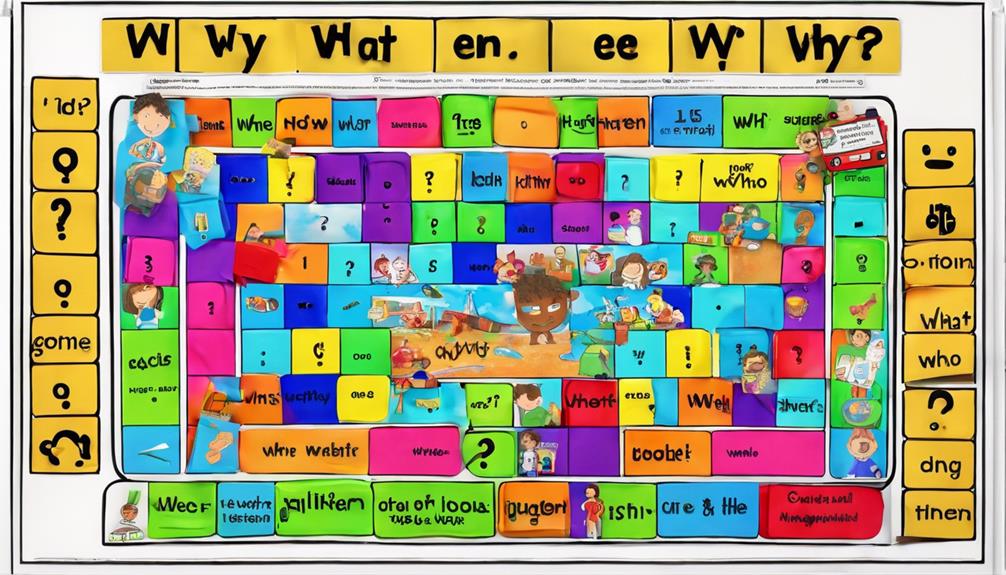
Engaging in interactive activities that involve real-life pictures and interactive books can enhance children's understanding and practice of WH questions in speech therapy sessions. Utilizing these tools can make learning more enjoyable and effective.
Here are some engaging activities for WH questions in speech therapy:
- Using real-life pictures to prompt responses and improve comprehension skills.
- Incorporating interactive books to practice Who, Where, and What questions in a fun and educational manner.
- Implementing leveled sentence formulation activities with real pictures to help children grasp different WH question concepts.
- Formulating and asking a variety of WH questions during therapy sessions to provide learning opportunities and reinforce response skills.
Enhancing Communication Through WH Questions
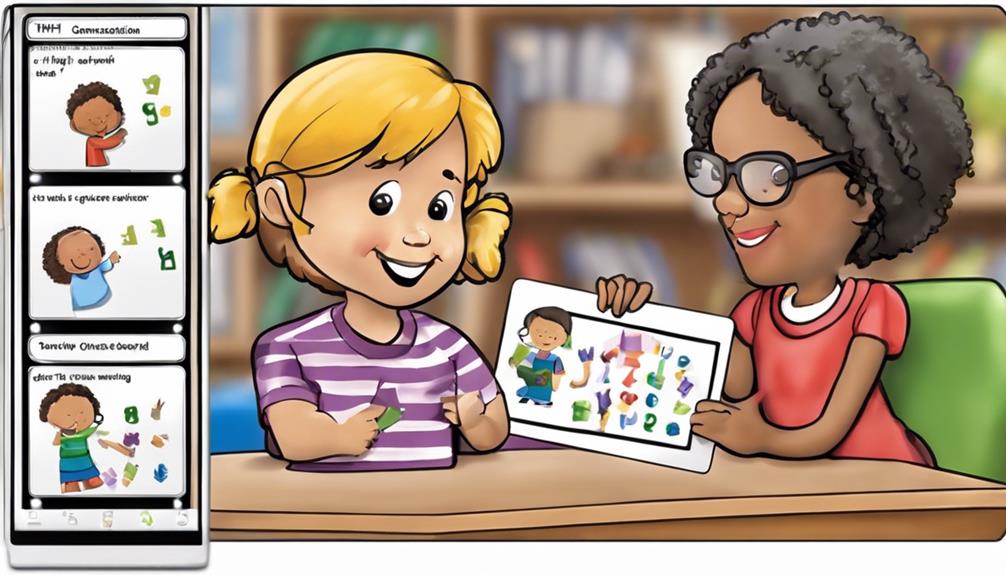
Transitioning from engaging activities for WH questions is crucial in speech therapy sessions for fostering language development and social interaction skills.
Enhancing communication through these inquiries is pivotal. In speech therapy, we target WH questions to help individuals ask and answer questions correctly, make connections between words, and reach communication milestones.
By practicing WH questions, individuals can improve their ability to inquire about their surroundings, express thoughts effectively, and engage in meaningful dialogues. Some individuals may have trouble answering WH questions initially, but with the right therapy and support, they can enhance their communication skills.
Through structured therapy sessions, individuals are able to place WH questions in the correct context, leading to improved understanding and usage of these question types. Mastering WH questions in speech therapy is essential for individuals to develop their language comprehension, critical thinking abilities, and social interaction skills effectively.
Frequently Asked Questions
What Is the Hierarchy of Asking Questions in Speech Therapy?
In speech therapy, the hierarchy of asking questions starts with 'What,' followed by 'Who,' 'Where,' 'How,' 'When,' and 'Why.' Each question type presents increasing complexity.
Understanding this hierarchy helps tailor interventions. Progressing through the hierarchy allows targeted skill development. Mastery equips individuals with essential communication skills for social and academic contexts.
How Do You Answer Why Questions in Speech Therapy?
When we answer why questions in speech therapy, we need to delve into the reasons or causes behind a situation.
It's about fostering critical thinking and problem-solving skills. By encouraging children to respond to why questions, we help them grasp cause and effect relationships, promoting higher-level thinking and language development.
Addressing why questions in therapy sessions is key to enhancing communication skills and expressive language abilities. It's all about improving how we articulate thoughts, emotions, and intentions effectively.
WHat Are the Rules for Asking a WH Word Question?
When asking a WH question, it's crucial to understand the rules for each question word. Each WH word serves a unique purpose in seeking information.
By mastering these rules, we can enhance our communication skills and engage in meaningful conversations. Clarify doubts, seek understanding, and express thoughts effectively by following these guidelines.
Learning the ins and outs of asking WH questions empowers us to communicate with clarity and precision, fostering better connections with others.
What Are the 7 W and H Questions?
We know the 7 W and H questions are Who, What, Where, When, Why, and How. Each of these questions plays a crucial role in communication, helping us gather information and understand various situations.
By mastering these questions, we can enhance our language skills, critical thinking, and ability to communicate effectively. They're vital tools for academic success, social interactions, and problem-solving.
Understanding and using these questions can greatly benefit our cognitive abilities.
Conclusion
In conclusion, mastering WH questions in speech therapy is absolutely essential for children's language development and communication success. These skills are the key to unlocking effective communication and understanding in various social situations.
By honing in on WH question skills through tailored strategies and engaging activities, speech therapists can help children reach new heights in their language proficiency.
So, let's dive in and conquer WH questions together for unstoppable communication growth!
Therapies and Interventions
10 Auditory Memory IEP Goals for Speech Therapy Success
Get ready to supercharge auditory memory skills with these 10 targeted IEP goals in speech therapy.

Enhancing auditory memory in speech therapy is vital for children's cognitive development.
With 10 targeted IEP goals focusing on auditory memory skills, therapists can help children achieve success in recalling and processing spoken information effectively.
From improving memory span to enhancing attention and sequencing abilities, these goals aim to strengthen auditory processing speed and memory recall.
By tailoring goals to each child's unique needs and monitoring progress, therapists play a crucial role in enhancing auditory memory skills.
Key Takeaways
- Set specific auditory memory goals in IEP for targeted improvement.
- Use repetition and association techniques to strengthen memory recall.
- Engage in multi-sensory activities to enhance auditory memory development.
- Incorporate auditory sequencing tasks to improve working memory skills.
Developing Auditory Attention Skills
Developing auditory attention skills is crucial in speech therapy for enhancing the ability to focus on and remember auditory information effectively. In speech therapy, we focus on improving auditory memory through targeted activities and exercises tailored to each individual's needs. By practicing skills such as repeating spoken words, following instructions, and accurately recalling auditory information, we aim to strengthen auditory attention abilities. These skills are vital not only for academic success but also for navigating social interactions and daily communication with confidence.
Individualized Education Program (IEP) goals often include objectives related to auditory memory enhancement. By setting specific targets for improving auditory attention skills within the IEP, we can track progress and tailor interventions accordingly. Speech therapists work closely with individuals with speech and language difficulties to design activities that challenge and strengthen their auditory memory capacities. As progress is made in developing auditory attention skills, individuals typically demonstrate improved abilities to recall, follow, and repeat spoken information accurately, leading to enhanced communication and overall well-being.
Improving Auditory Discrimination Abilities

Improving auditory discrimination abilities is essential for enhancing speech and language skills in therapy sessions. Auditory discrimination involves the ability to differentiate between similar sounds or words, a crucial skill in speech therapy. By targeting auditory discrimination through specific auditory memory IEP goals, individuals can learn to distinguish speech sounds accurately.
This training is particularly beneficial for those with auditory processing disorders, as it can improve comprehension and communication during therapy sessions. Enhancing auditory discrimination not only aids in recognizing subtle differences in sounds but also contributes to overall speech and language development. Speech therapists focus on honing these skills to ensure that individuals can effectively distinguish between various speech sounds, leading to improved auditory memory and better speech outcomes in therapy.
Through dedicated practice and targeted interventions, individuals can make significant strides in their auditory discrimination abilities, ultimately enhancing their overall speech therapy experience.
Enhancing Auditory Sequencing Proficiency
Enhancing auditory sequencing proficiency is a vital component of advancing speech and language skills in therapy sessions. It involves the ability to accurately recall and repeat a sequence of auditory information, which is essential for following instructions, understanding narratives, and retaining information in the correct order.
When setting IEP goals for auditory sequencing, focusing on improving working memory skills can enhance the accuracy and speed of recalling spoken sequences. These goals may include tasks like repeating spoken numbers, recalling lists in order, or reproducing sequences of sounds accurately.
Strengthening Auditory Memory Recall

While addressing auditory memory recall, we aim to strengthen the ability to accurately retain and recall spoken information. This is crucial for achieving success in academic and daily life tasks. Here are three key strategies to enhance auditory memory recall through IEP goals in Speech Therapy:
- Repetition: Encouraging repetition of spoken information helps reinforce memory recall and retention.
- Association Techniques: Teaching individuals to associate new information with existing knowledge can aid in memory recall.
- Multi-Sensory Activities: Engaging multiple senses during learning, such as combining visual aids with auditory input, can improve memory recall abilities.
Building Auditory Processing Speed
Addressing auditory processing speed involves implementing targeted exercises and strategies to enhance the interpretation and response time to auditory information. As Speech Language Pathologists, setting specific IEP goals aimed at improving auditory processing speed is crucial. By incorporating activities that challenge quick processing of auditory information, individuals can strengthen their ability to understand and respond promptly in various situations. These exercises may include listening to rapid speech, following multi-step directions, and engaging in activities that require quick auditory discrimination.
Improving auditory processing speed can significantly benefit individuals in academic settings, social interactions, and overall communication skills. Through consistent practice and tailored interventions, individuals can enhance their ability to process auditory information efficiently. Setting clear IEP goals focused on building auditory processing speed can lead to improved academic outcomes, better comprehension of verbal instructions, and enhanced participation in conversations. By working collaboratively with Speech Language Pathologists, individuals can make strides in developing this essential skill for effective communication.
Enhancing Auditory Comprehension Skills

Our focus lies in honing the essential auditory comprehension skills necessary for effective communication and interaction. When it comes to setting IEP goals for improving auditory memory in speech therapy, enhancing auditory comprehension skills is crucial.
Here are some strategies to achieve this:
- Repetition: Repeating information helps reinforce understanding and retention.
- Visual aids: Utilizing visual tools alongside spoken information can aid in comprehension.
- Chunking information: Breaking down spoken content into smaller, manageable chunks facilitates better understanding.
In speech therapy sessions, IEP goals may include tasks such as recalling spoken instructions, following auditory directions, and summarizing spoken content. Progress in enhancing auditory comprehension skills not only improves communication but also boosts academic performance and social interactions.
Improving Auditory Memory Span
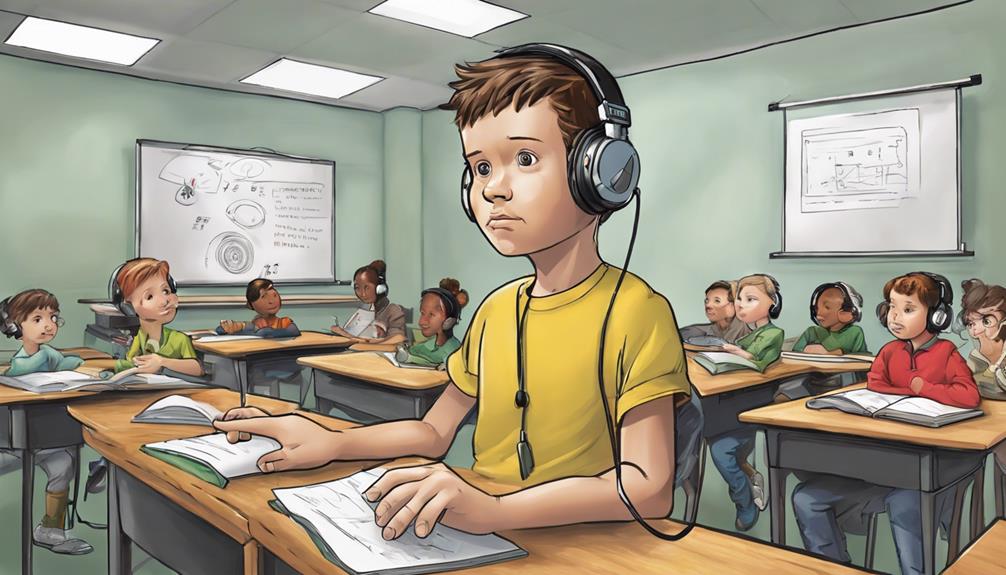
To enhance auditory memory span, it is essential to implement targeted strategies that focus on improving the ability to recall and repeat sequences of spoken information accurately. Setting IEP goals for auditory memory span involves tasks such as recalling spoken words, following instructions, and repeating numbers. Effective strategies for improving auditory memory span include repetition, chunking information, and using mnemonic devices. Progress in auditory memory span can be measured through assessments, observations, and data collection to track improvements over time.
| Strategies for Improving Auditory Memory Span | Examples |
|---|---|
| Repetition | Repeating sequences of numbers or words multiple times. |
| Chunking Information | Grouping information into smaller, manageable chunks. |
| Mnemonic Devices | Using memory aids like acronyms or visualization techniques. |
| Data Collection | Recording performance on memory tasks to monitor progress. |
Enhancing Auditory Memory for Instructions

Enhancing auditory memory for instructions involves honing the ability to accurately retain and recall spoken directives. When setting IEP goals for auditory memory in speech therapy, it's crucial to focus on improving the capacity to follow and execute multi-step directions effectively.
To enhance auditory memory for instructions, consider the following strategies:
- Repetition: Encourage repeating instructions to reinforce memory retention.
- Chunking Information: Break down complex instructions into smaller, manageable chunks.
- Visual Aids: Utilize visual cues or diagrams to support auditory memory development.
Strengthening Auditory Memory for Details

As speech therapists, we recognize the importance of strengthening auditory memory for remembering intricate details effectively.
By implementing detail retention strategies, individuals can enhance their memory skills and improve their ability to recall specific information accurately.
These techniques play a crucial role in supporting better comprehension and retention of crucial details in various conversations and instructions.
Detail Retention Strategies
Implementing repetition and rehearsal techniques is fundamental in strengthening auditory memory for details. To enhance detail retention, we recommend the following strategies:
- Encourage summarizing information actively to improve retention.
- Utilize visual aids and graphic organizers to support memory recall.
- Break down complex information into smaller, manageable chunks for better processing.
Enhancing Memory Skills
How can we effectively strengthen auditory memory for details in speech therapy to enhance memory skills?
Strengthening auditory memory skills is crucial for individuals to accurately recall and retain specific details from spoken information. This enhancement plays a vital role in facilitating the ability to follow multi-step directions with precision.
By developing auditory memory abilities, individuals can better remember sequences of unrelated spoken syllables and reproduce complex spoken sentences more accurately. Speech therapy focused on strengthening auditory memory can significantly improve an individual's capacity to retain and recall important details, such as phone numbers or instructions.
Setting IEP goals that target enhancing auditory memory skills can lead to notable advancements in an individual's ability to process and remember information effectively.
Developing Auditory Memory for Conversations

Improving auditory memory for conversations involves actively engaging in strategies that enhance the retention and recall of spoken information.
When working towards developing auditory memory skills specifically for conversations in speech therapy, it's crucial to focus on the following key points:
- Recalling Spoken Information: Practice recalling details from recent conversations to improve memory retention.
- Participating Actively: Engage in conversations by listening attentively and responding appropriately to strengthen auditory memory.
- Summarizing Discussions: Summarize conversations after they occur to reinforce memory and understanding of the content.
Frequently Asked Questions
What Are the Memory Strategies Goal for Speech Therapy?
In speech therapy, we focus on memory strategies to improve auditory memory skills. These goals help us recall and retain spoken information like words and instructions.
By using exercises like repetition and mnemonic devices, we can enhance memory. Visual aids and chunking info also support auditory memory.
Setting measurable goals allows us to track progress and customize interventions for effective therapy. These strategies lead to better communication and language development.
What Are the Goals for Auditory Discrimination in Speech Therapy?
In speech therapy, our goals for auditory discrimination focus on improving the ability to differentiate between similar sounds or words. By enhancing listening skills, phonemic awareness, and speech sound discrimination, we aim to strengthen auditory processing essential for speech and language development.
Specific objectives may include distinguishing between minimal pairs like 'pat' and 'bat' or 'ship' and 'sip.' Achieving these goals can lead to enhanced communication, speech clarity, and overall language proficiency.
What Is the Goal of Auditory Closure Speech Therapy?
We aim to enhance auditory closure skills in therapy to boost comprehension and communication. By filling in missing parts of spoken information, we help improve listening accuracy and memory.
Success in this area can lead to better academic performance and social interactions. It's a vital aspect of speech therapy that aids in overall language development.
What Are the IEP Goals for Phonological Memory?
We aim to enhance phonological memory through IEP goals. These goals target the ability to process and recall auditory information accurately. Objectives include improving word retention, following spoken instructions, and recalling sound sequences.
Strengthening auditory processing skills aids in effective communication and learning. By setting measurable phonological memory goals, individuals with auditory challenges can develop strategies for better information retention and retrieval.
These goals in an IEP can lead to improved speech therapy outcomes and academic success.
Conclusion
In conclusion, setting auditory memory IEP goals in speech therapy is essential for helping children improve their ability to recall spoken information accurately.
Just like a musician fine-tuning their ear to play a perfect melody, these goals help children sharpen their listening skills to better understand and retain information.
By focusing on specific auditory memory skills tailored to each child's needs, speech therapists can guide them towards success in communication and learning.
Jamie is one of the creative forces behind the words that resonate with our audience at Deaf Vibes. With a passion for storytelling and advocacy, Jamie delves into topics that matter deeply to the deaf and hard-of-hearing community. Jamie’s articles are crafted with empathy, insight, and a commitment to positive change, from exploring the latest advancements in hearing technologies to shedding light on the everyday challenges and victories of those within the community. Jamie believes in the power of shared stories to inspire action, foster understanding, and create a more inclusive world for everyone.
Therapies and Interventions
5 Auditory Comprehension Therapy Techniques for Better Understanding
Step into the world of auditory therapy techniques that can revolutionize your comprehension skills, starting with discrimination exercises and memory strategies – discover what's next!

As we explore auditory comprehension therapy techniques for better understanding, you might not be aware of the impactful methods that professionals employ to enhance this crucial skill.
From specific exercises targeting discrimination to strategies focusing on memory and context clues, the realm of auditory therapy holds numerous tools waiting to be discovered.
By uncovering these techniques, individuals can unlock a world of improved communication and learning abilities.
Key Takeaways
- Auditory Discrimination Training enhances sound differentiation for improved understanding.
- Following Directions Exercises boost listening skills and academic performance.
- Memory enhancement techniques like repetition and visualization aid in better comprehension.
- Active Listening Strategies, including asking clarifying questions, improve communication skills effectively.
Auditory Discrimination Training
In Auditory Discrimination Training, we focus on enhancing individuals' ability to differentiate between various sounds or words to improve comprehension. This therapy technique is crucial in speech therapy as it helps individuals with language processing difficulties. By engaging in exercises that require distinguishing subtle differences in auditory stimuli, individuals can improve their auditory comprehension skills. For those with aphasia or other communication disorders, Auditory Discrimination Training plays a vital role in sharpening their listening abilities.
Through targeted activities and practice, individuals can strengthen their auditory discrimination, leading to better interpretation of spoken language. By honing these skills, individuals can enhance their overall auditory processing abilities, resulting in improved understanding and communication. This training method is designed to assist individuals in accurately perceiving and interpreting auditory information, ultimately aiding in their language comprehension. In the realm of Speech Therapy, Auditory Discrimination Training is a fundamental technique for enhancing auditory comprehension and communication skills.
Following Directions Exercises

Engaging in following directions exercises enhances auditory comprehension skills in children, fostering improved understanding and academic performance. These exercises are crucial for improving communication and addressing auditory comprehension deficits in children. By practicing following directions tasks, children can develop compensatory strategies to overcome challenges in understanding instructions.
Here is a table highlighting the benefits of following directions exercises for improving auditory comprehension:
| Benefits of Following Directions Exercises |
|---|
| Helps improve listening skills |
| Enhances ability to process information |
| Boosts academic performance |
| Provides targeted practice for specific difficulties |
| Fosters effective communication skills |
To help your child improve their auditory comprehension, incorporating following directions exercises into their routine can make a significant difference. Consistent practice and support are key in helping children develop these essential skills for better communication and academic success.
Auditory Memory Enhancement Techniques
Transitioning from following directions exercises, auditory memory enhancement techniques focus on improving retention and recall of auditory information through strategies like repetition, visualization, and chunking. These techniques aim to increase auditory comprehension by strengthening auditory processing and memory.
Here are some key points to consider:
- Repetition: Repeating information helps reinforce memory and aids in better retention of spoken details.
- Visualization: Creating mental images of the information being heard can enhance memory recall.
- Chunking: Breaking down information into smaller, manageable chunks improves the ability to process and remember larger amounts of data.
- Overall Improvement: Implementing auditory memory enhancement techniques can lead to better language comprehension, reduced communication breakdowns, and improved learning outcomes.
Context Clue Utilization

Utilizing context clues enhances comprehension by analyzing surrounding information to decode unfamiliar words or phrases. Context clue utilization plays a critical role in language processing, especially for individuals with global aphasia.
When faced with written directions or unfamiliar terms, understanding context clues can aid in deciphering meanings and enhancing overall comprehension. As Speech-Language Pathologists, we often encourage patients to pay close attention to details such as tone, setting, or related words to infer the intended message.
By honing this skill, individuals can fill in gaps in understanding and improve their ability to grasp information more effectively. Context clue utilization is a valuable technique that provides additional context to support individuals in interpreting language and communicating more clearly.
Developing proficiency in identifying and interpreting context clues can significantly boost auditory comprehension skills and empower individuals to navigate various communication scenarios with greater ease.
Active Listening Strategies
Active listening strategies play a crucial role in enhancing comprehension and communication effectiveness by incorporating techniques such as maintaining eye contact and providing verbal cues to show engagement. When practicing active listening, remember to:
- Ask clarifying questions: This demonstrates your interest and ensures you understand the spoken language accurately.
- Paraphrase what you heard: Summarizing the speaker's words not only confirms your understanding but also shows that you're actively engaged in the conversation.
- Reflect on emotions and body language: Paying attention to non-verbal cues enhances comprehension and helps in responding appropriately.
- Practice regularly: Consistent use of active listening techniques can be particularly beneficial for individuals with Wernicke's aphasia or other communication disorders. Speech-Language Pathologists often recommend these strategies to improve overall communication skills.
Frequently Asked Questions
How Do You Improve Auditory Comprehension?
Improving auditory comprehension involves using strategies like chunking and visualization, which enhance understanding in children. Tailored support from Speech-Language Pathologists is vital for implementing these techniques effectively.
Repetition is key in developing auditory comprehension skills. By employing teaching methods such as chunking and visualization, children can better grasp information, aiding in academic success.
Strong auditory comprehension skills are crucial for improved academic performance and readiness for future educational challenges.
What Are Auditory Comprehension Activities?
When it comes to auditory comprehension activities, they involve tasks like listening to instructions, following directions, and answering questions based on spoken information. These exercises target enhancing understanding of verbal cues, improving listening skills, and increasing retention of auditory information.
Examples of such activities include story listening, auditory memory games, and comprehension exercises. Engaging in these activities helps individuals develop language skills, boost communication abilities, and enhance overall cognitive function.
How Can I Improve My Auditory Attention?
We can improve auditory attention by practicing active listening techniques, minimizing distractions, using visual aids, and engaging in activities that require following verbal instructions.
Seeking guidance from Speech-Language Pathologists can provide tailored strategies to enhance auditory attention.
By focusing on the speaker's words, maintaining eye contact, and staying alert, we can strengthen our ability to comprehend auditory information effectively.
These simple strategies can make a significant difference in improving auditory attention.
How Can I Improve My Auditory Sense?
Improving our auditory sense involves engaging in activities that challenge our listening skills.
We can practice active listening by focusing on the speaker and using visual aids to support our understanding.
Seeking guidance from a speech-language pathologist can provide tailored strategies for enhancing our ability to interpret spoken language effectively.
Conclusion
In conclusion, mastering auditory comprehension therapy techniques is like unlocking a treasure trove of understanding. By incorporating strategies like:
- Auditory discrimination training
- Following directions exercises
- Auditory memory enhancement techniques
- Context clue utilization
- Active listening strategies
Individuals can open the doors to clearer communication and improved learning experiences.
These techniques serve as powerful tools to enhance comprehension skills and navigate the world with confidence. Embrace these techniques and watch your understanding soar to new heights.
Jamie is one of the creative forces behind the words that resonate with our audience at Deaf Vibes. With a passion for storytelling and advocacy, Jamie delves into topics that matter deeply to the deaf and hard-of-hearing community. Jamie’s articles are crafted with empathy, insight, and a commitment to positive change, from exploring the latest advancements in hearing technologies to shedding light on the everyday challenges and victories of those within the community. Jamie believes in the power of shared stories to inspire action, foster understanding, and create a more inclusive world for everyone.
Therapies and Interventions
What Is Expressable Speech Therapy and How Does It Work?
Heralding a new era of communication, Expressable Speech Therapy unveils its innovative methods, promising a journey of transformation and connection.
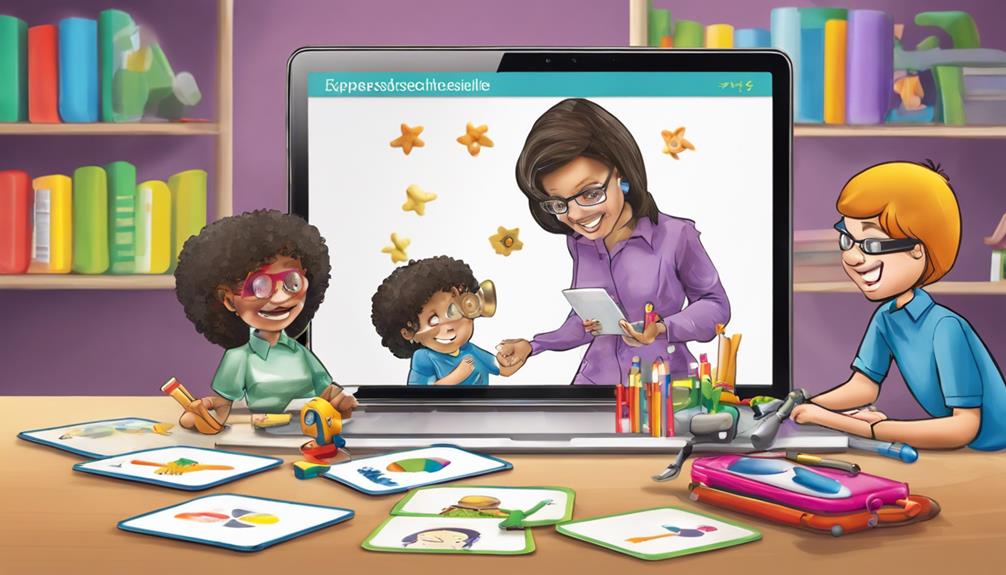
Imagine a world where words flow effortlessly, where communication is a seamless dance of expression. In this realm, Expressable speech therapy acts as a guiding light, illuminating the path to improved speech and language skills.
But how does this innovative approach actually work? Let's explore the intricacies of this virtual platform that is revolutionizing the way we connect and communicate.
Key Takeaways
- Expressable Speech Therapy offers personalized online sessions for speech, language, voice, and swallowing issues.
- Tailored treatment plans cater to individual communication needs and goals effectively.
- Certified therapists provide innovative therapy approaches with flexible scheduling options.
- Specialized care strategies address unique speech challenges for all ages.
Overview of Expressable Speech Therapy
At Expressable Speech Therapy, our certified speech-language pathologists provide personalized online sessions to address speech, language, voice, and swallowing issues from the convenience of your home. Our online platform offers a unique opportunity to receive speech therapy in a comfortable and familiar setting, eliminating the need to travel to appointments. Through our tailored care approach, our therapists design individualized treatment plans to meet each client's specific communication needs.
Communication is at the core of what we do. Our therapists work closely with clients to improve their ability to express themselves effectively and confidently. Whether it's articulation, fluency, voice modulation, or swallowing difficulties, our team is dedicated to helping clients enhance their communication skills.
With online therapy, clients benefit from the expertise of our therapists without the constraints of traditional in-person sessions. Our secure and private platform ensures that clients can access therapy from anywhere at a time that suits them best. Experience the convenience and effectiveness of online speech therapy with Expressable.
Benefits of Online Therapy Sessions

Moving forward, let's explore the advantages of engaging in online therapy sessions with Expressable Speech Therapy. Online speech therapy offers a range of benefits that cater to the needs of clients seeking convenient and effective speech therapy services. Here are some key benefits of choosing online therapy with Expressable:
| Benefits of Online Therapy Sessions | ||
|---|---|---|
| Flexible Scheduling Options | High Satisfaction | Secure Platform |
| Convenient Access | Text Support |
Expressable's online therapy sessions provide flexible scheduling options, allowing clients to easily fit therapy into their busy lifestyles. The high satisfaction rate, with an average rating of 4.9/5, underscores the effectiveness and quality of the online therapy services offered. Additionally, the secure platform ensures confidential care, while the convenient access to therapy 7 days a week enables clients to receive the support they need when it suits them best. Furthermore, the availability of text support throughout the week between sessions enhances the overall experience and progress in therapy.
Personalized Treatment Plans
Personalized treatment plans at Expressable Speech Therapy are meticulously crafted to address each client's unique speech and language requirements. Our therapists take the time to understand each individual's communication challenges and goals, allowing them to create tailored interventions that focus on improving speech clarity and boosting communication confidence.
By setting individualized goals, we ensure that our clients receive targeted interventions that are specifically designed to help them progress in their speech therapy journey. These plans aren't one-size-fits-all; instead, they're customized to meet the needs of each person we work with. Whether someone is struggling with articulation, language skills, or overall communication abilities, our personalized treatment plans are structured to support their development and growth.
At Expressable, we believe that by offering personalized care, we can better serve our clients and help them achieve their speech therapy objectives effectively. Our commitment to creating customized treatment plans ensures that every individual receives the support and attention they need to succeed in improving their communication skills.
Tailored Therapy for Unique Needs

At Expressable, we tailor therapy to meet your unique needs through customized treatment plans, a personalized approach to therapy, and individualized care strategies.
Our specialized therapists are dedicated to addressing your specific communication challenges to ensure effective and personalized treatment.
Whether it's accent modification, gender-affirming voice training, or other speech and language issues, we cater to individuals of all ages with a focus on achieving your individual goals.
Customized Treatment Plans
Crafting tailored treatment plans at Expressable involves precisely addressing each individual's unique speech therapy needs. Our approach is dedicated to providing personalized therapy sessions that target specific communication challenges and goals effectively.
To ensure the best treatment outcomes, specialized therapists are matched with clients based on their distinct needs for optimal progress and success. Treatment plans are meticulously designed to enhance speech, language, voice, and swallowing issues with care and precision.
Each therapy session is carefully crafted to focus on the individual's specific areas of concern, fostering continual progress and eventual success. Through this personalized approach, we strive to meet the diverse needs of our clients and support them on their journey to improved communication skills.
Personalized Approach to Therapy
Our focus on individualized treatment plans at Expressable seamlessly extends to tailoring therapy sessions to meet each client's unique needs and goals. Therapists at Expressable understand the importance of personalized care in speech therapy.
By creating tailored therapy sessions that align with each individual's communication objectives, we ensure that clients receive interventions specifically designed to address their speech, language, or communication disorder effectively. This tailored approach enhances the overall effectiveness of therapy by concentrating on the areas where improvement is needed the most.
At Expressable, we prioritize meeting the unique needs of each client, empowering them to make significant progress in their communication skills through our personalized therapy sessions.
Individualized Care Strategies
Tailoring therapy sessions at Expressable to meet the unique needs and goals of each client is paramount in our approach to individualized care strategies.
- Our specialized therapists are matched to clients based on their specific communication challenges and requirements.
- Customized therapy plans are designed to maximize progress and results for each individual.
- The focus is on providing personalized attention and support to help clients achieve their communication objectives.
Convenience of Online Sessions

We understand the importance of convenience in your busy schedule.
Virtual therapy offers benefits such as flexibility in scheduling and the ability to access sessions from anywhere.
These advantages make online speech therapy a practical and efficient choice for our clients.
Virtual Therapy Benefits
With virtual speech therapy sessions offered seven days a week, clients can conveniently receive care from the comfort of their own homes, eliminating the need for lengthy commutes to traditional therapy locations.
- Flexibility: Clients have the freedom to schedule sessions at times that suit their daily routines.
- Home Practice: Practicing speech exercises in a familiar environment can lead to more effective results.
- Secure Platform: Expressable ensures a confidential and safe online space for therapy sessions.
Scheduling Flexibility Advantages
For individuals seeking the convenience of online speech therapy sessions, Expressable provides flexible scheduling options that cater to busy lifestyles and varying time zones.
Our virtual speech therapy sessions are available seven days a week, offering clients the flexibility to fit therapy around their schedules. Through video chat, our online therapy works seamlessly, allowing clients to receive care from the comfort of their homes without the need for long commutes.
With our flexible hours, clients can easily schedule sessions that work best for them, ensuring consistent progress towards their speech therapy goals.
We understand the importance of accommodating busy lifestyles, and our platform prioritizes making speech therapy accessible and convenient for all.
Access From Anywhere
Ensuring accessibility from any location, Expressable offers online speech therapy sessions that provide convenience and flexibility for clients seeking to improve their communication skills.
- Clients can receive virtual therapy sessions from the comfort of their own home, eliminating the need for long commutes.
- Online sessions are available 7 days a week, offering flexible scheduling options to accommodate busy lifestyles.
- The platform used for online therapy is private and secure, ensuring confidentiality and a safe environment for therapy.
With the convenience of accessing a speech therapist online, individuals can benefit from the flexibility of scheduling sessions at their convenience. The secure platform used for virtual therapy sessions adds an extra layer of comfort and privacy, making the therapy experience more accessible and effective.
Communication Skills Improvement
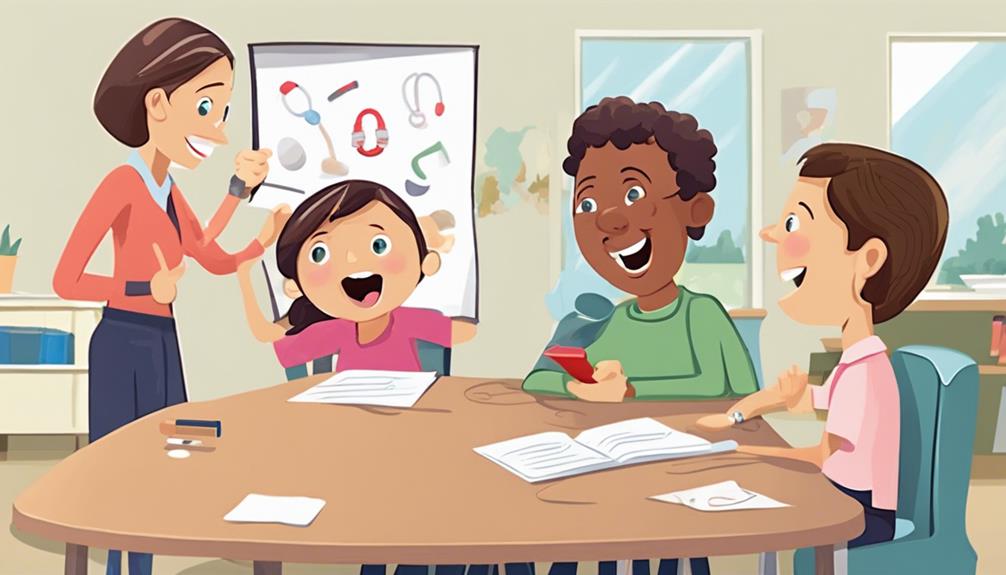
Improving communication skills through Expressable Speech Therapy leads to enhanced confidence and comfort in speaking. By targeting articulation, vocal techniques, and providing effective communication tools, individuals acquire the necessary skills to express themselves clearly and confidently.
Through tailored therapy sessions, clients engage in exercises that promote skill development and consistency in progress. The average satisfaction rating of 4.9/5 indicates high levels of contentment among clients, highlighting the effectiveness of the therapy in addressing speech challenges.
Additionally, the inclusion of texting support throughout the week offers continuous guidance and encouragement for applying newly acquired communication skills in real-life scenarios. This comprehensive approach ensures that individuals not only enhance their communication abilities but also feel empowered to communicate effectively in various contexts.
Expressable Speech Therapy equips clients with the tools and techniques needed to communicate confidently, ultimately leading to improved overall communication skills and increased self-assurance.
Overcoming Speech Challenges

Transitioning from improving communication skills, overcoming speech challenges with Expressable Speech Therapy involves personalized online sessions tailored to address a range of issues such as stuttering, aphasia, voice disorders, and more. Certified speech-language pathologists guide clients through targeted exercises to help them overcome their specific speech difficulties. These professionals work closely with individuals to create customized therapy plans that cater to their unique needs and goals.
The practice exercises recommended by the therapists are designed to reinforce the learning from sessions and accelerate progress in speech improvement. Through these personalized online sessions, individuals can work on enhancing their communication skills in a comfortable and convenient environment.
The supportive nature of the program aims to boost confidence levels and proficiency in both verbal and nonverbal interactions. Clients can expect dedicated guidance and expertise from experienced speech-language pathologists to navigate and conquer their speech challenges effectively.
Innovative Therapy Approach
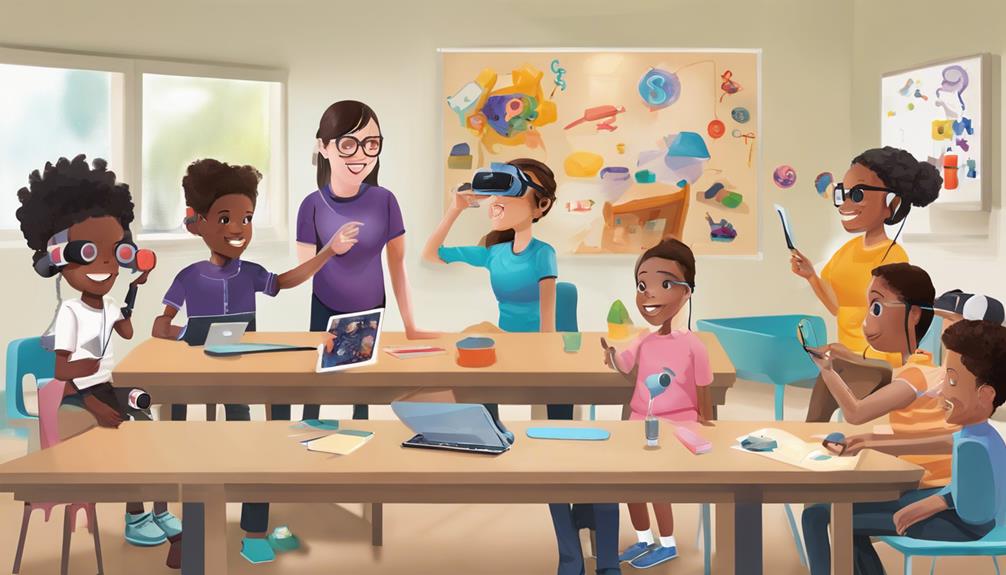
Utilizing cutting-edge technology and personalized therapy plans, Expressable Speech Therapy implements an innovative approach to address a variety of speech challenges effectively. Our tailored therapists work closely with clients to create individualized therapy plans that cater to specific needs and goals. Through live online sessions, clients engage in practice exercises designed to reinforce learning and promote progress between sessions. Additionally, we offer texting support throughout the week to provide continuous assistance and guidance.
Convenience is key in our therapy approach, with flexible scheduling options that make it easy for clients to fit sessions into their busy lives. Moreover, our focus extends beyond the virtual session, encouraging clients to apply newly acquired skills in real-life situations for tangible communication improvement. By practicing communication strategies in everyday scenarios, clients can see a direct impact on their ability to effectively convey their thoughts and ideas. This holistic approach sets Expressable Speech Therapy apart, ensuring comprehensive support for our clients as they work towards their speech therapy goals.
Revolutionizing Speech Therapy Services

Revolutionizing speech therapy services at Expressable involves incorporating cutting-edge technology and personalized care to enhance communication skills effectively. Our online speech therapy platform is designed to provide tailored services that cater to individuals of all ages in a convenient and accessible way. Here are three key aspects that set our services apart:
- Tailored Services: Each client receives personalized care from our certified speech-language pathologists, ensuring that the therapy sessions address their specific needs and goals effectively.
- Convenience: Through our online platform, clients can access speech therapy from the comfort of their own homes, eliminating the need for travel and allowing for flexible scheduling options to fit busy lifestyles.
- Accessibility: By focusing on online speech therapy, we aim to make communication skills improvement more accessible to a wider range of individuals, breaking down barriers to receiving quality care.
At Expressable, we're committed to providing a service that not only enhances communication skills but also prioritizes the convenience and accessibility of speech therapy for all.
Client-Centered Care Approach
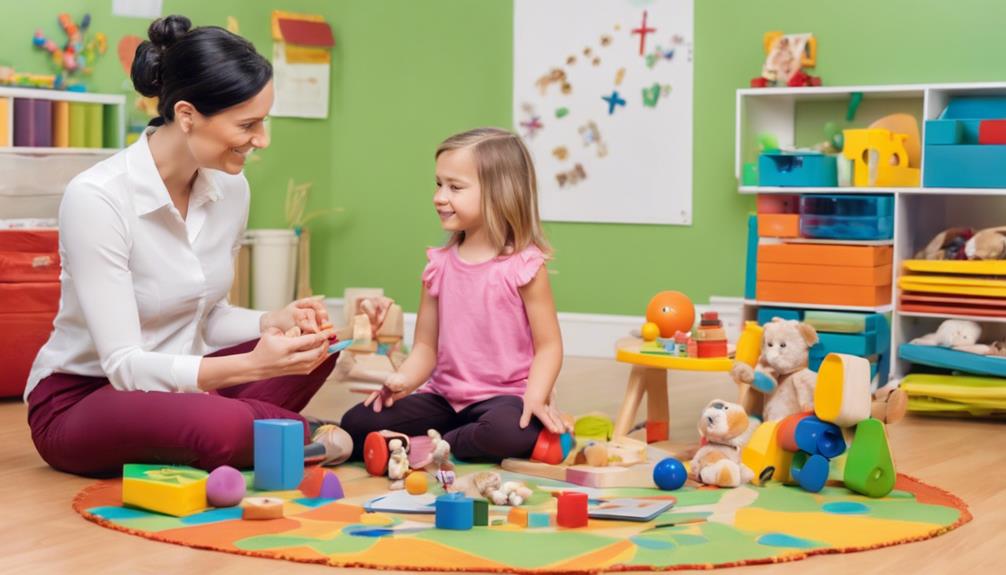
At Expressable Speech Therapy, we prioritize a client-centered care approach, where therapy plans are customized to meet individual needs and goals.
Therapists track each client's progress closely, ensuring that treatment remains effective and tailored.
Personalized Therapy Plans
When creating personalized therapy plans at Expressable, we prioritize a client-centered care approach that tailors each plan to the individual's unique needs and goals.
- Therapy plans are customized to address the specific communication needs of each child.
- Client input is valued in setting therapy goals, fostering a collaborative relationship.
- The therapy plans evolve based on client progress, feedback, and changing communication requirements.
This personalized approach ensures that therapy at Expressable is effective, engaging, and aligned with the individual's communication journey. By focusing on the client's distinct needs and aspirations, we strive to provide a supportive and empowering environment for growth and development.
Individual Progress Tracking
Individual progress tracking at Expressable Speech Therapy is a pivotal aspect of our client-centered care approach, allowing us to tailor therapy sessions to meet each client's specific needs and goals. By monitoring individual progress closely, we can create personalized care plans that are adjusted based on each client's feedback and advancements. This approach enables us to optimize results by making real-time adjustments to therapy techniques, exercises, and goals. Our therapists are committed to using client-centered care approaches to monitor improvements, address any barriers hindering progress, and celebrate successes along the therapy journey. Through continuous assessment and adaptation of treatment plans, we ensure that each session is maximally effective and contributes to our clients' speech therapy goals.
| Benefits of Individual Progress Tracking | |
|---|---|
| Tailored therapy sessions | Personalized care plans |
| Optimized results | Client-centered care approaches |
Speech Therapy Co-Pilot System

The Speech Therapy Co-Pilot System by Expressable is a unique tool that enhances therapy outcomes for clients by providing personalized exercises and consistent text message support. This system aims to improve communication skills effectively by offering the following key features:
- Personalized exercises tailored to individual needs and goals, allowing clients to practice specific areas of speech and language between therapy sessions.
- Text message support throughout the week to encourage progress and consistency, providing gentle reminders and motivational messages to keep clients engaged.
- Guidance on implementing new skills and techniques in real-life communication scenarios, helping clients transfer what they learn in therapy to everyday interactions.
With the Speech Therapy Co-Pilot System, clients receive the necessary support and resources to reinforce their learning, enhance their communication skills, and track their progress effectively. This personalized approach ensures that clients can make meaningful strides in their speech therapy journey.
Learning and Progress Tracking
Our progress tracking tools at Expressable empower us to monitor improvements in speech and language skills effectively, allowing for tailored treatment plans and informed adjustments based on data and client feedback.
By utilizing data and feedback, our therapists can make precise modifications to treatment plans, ensuring optimal results for our clients.
Through regular updates on progress and achievements during therapy sessions, clients are actively engaged in their journey towards improved communication skills.
Our tracking methods, which include assessments, practice logs, and ongoing communication with therapists, provide a comprehensive view of each individual's progress.
This transparency and accountability within our platform not only enhances the effectiveness of therapy but also fosters a sense of trust and collaboration between therapists and clients.
At Expressable, we're committed to using cutting-edge progress tracking tools to deliver personalized speech therapy that prioritizes the unique needs and goals of each individual.
Success Stories and Testimonials

As clients progress through their speech therapy journey with Expressable, their success stories and testimonials highlight the transformative impact of our personalized approach. Our clients have shared inspiring stories of growth and development as they work towards their speech goals. Here are a few key points that stand out:
- Improved Confidence: Many clients have reported a significant boost in their confidence levels after engaging in therapy with Expressable. This newfound confidence has translated into more comfortable and effective communication in their personal and professional lives.
- Tangible Progress: Clients frequently mention the noticeable progress they make in addressing their speech challenges with the help of our tailored vocal techniques and communication strategies.
- Enhanced Communication Skills: Expressable equips individuals with the necessary skills to communicate effectively in diverse settings, empowering them to express themselves with clarity and precision.
These testimonials underscore the positive outcomes that can be achieved through dedicated speech therapy and the commitment of our team to support each client's journey towards improved communication.
Frequently Asked Questions
What Are the Two Types of Speech Therapy?
There are two types of speech therapy: pediatric and adult. Pediatric speech therapy focuses on children's communication and language development, while adult speech therapy addresses communication challenges in grown-ups, like voice disorders and accent modification.
Both therapies aim to enhance speech, language, and communication skills. Specialized therapists provide personalized care based on age and specific needs in each type of speech therapy.
How Does the Speech Therapy Work?
Well, speech therapy works wonders by helping us unlock our communication potential. Therapists guide us through exercises, build our confidence, and refine our vocal skills.
With Expressable, we receive tailored support to practice between sessions and even get texting help throughout the week. It's like having a personal speech coach right at our fingertips, empowering us to speak with clarity and confidence in real-life situations.
How Effective Is Virtual Speech Therapy?
Virtual speech therapy is highly effective, offering comparable progress to in-person sessions. Research indicates its success in improving speech and language skills, particularly benefiting those in remote areas.
The convenience of online therapy, with flexible scheduling and access to specialized therapists, has made it a popular choice. It provides a convenient and accessible way to receive quality care without the need for commuting.
What Is the Difference Between Speech Therapy and Voice Therapy?
Voice therapy and speech therapy differ in their focus. Voice therapy targets vocal function and quality, working on resonance and pitch control. On the other hand, speech therapy addresses a broader range of communication disorders like articulation and language.
Both therapies are provided by certified professionals but with distinct goals and techniques. Understanding these differences is crucial for individuals seeking treatment for voice or speech-related concerns.
Conclusion
In conclusion, Expressable speech therapy offers a convenient and effective way to address speech difficulties. With tailored therapy sessions, personalized treatment plans, and a client-centered care approach, individuals can enhance their communication skills from the comfort of their own home.
The Speech Therapy Co-Pilot system provides support and guidance throughout the process, making the journey to improved speech and expression a positive and empowering experience.
Join us on this journey to unlock your full communication potential.
-
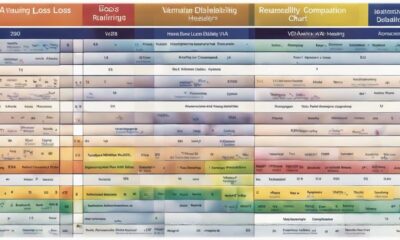
 Navigating the VA System2 months ago
Navigating the VA System2 months agoVA Hearing Loss Rating Chart: Understanding Disability Compensation
-
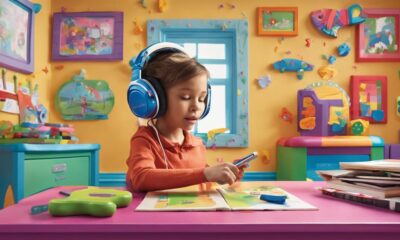
 Therapies and Interventions2 weeks ago
Therapies and Interventions2 weeks ago10 Auditory Processing Goals for Effective Speech Therapy
-

 Vetted2 months ago
Vetted2 months ago15 Best Oticon Hearing Aids to Improve Your Hearing in 2024
-

 Tinnitus2 months ago
Tinnitus2 months agoVA's Rating System for Tinnitus and Hearing Loss Explained
-

 Navigating the VA System1 month ago
Navigating the VA System1 month agoUnderstanding Bilateral Hearing Loss VA Rating Criteria
-

 Sign Language2 weeks ago
Sign Language2 weeks agoMastering the Art of Signing Letters in Sign Language
-

 Sign Language3 weeks ago
Sign Language3 weeks agoSign Language Emoji Translator: How to Communicate With Gestures
-

 Sign Language3 months ago
Sign Language3 months agoMedical Sign Language PDF: A Comprehensive How-To Guide
